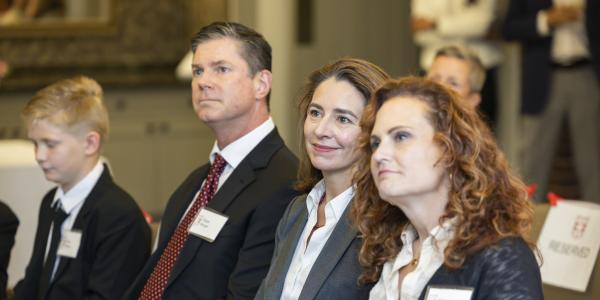
On September 4, Crickette Sanz was installed as the James W. and Jean L. Davis Professor in Arts and Sciences. The program included a welcome from Feng Sheng Hu, the Richard G. Engelsmann Dean of Arts & Sciences and Lucille P. Markey Distinguished Professor; an introduction by Rebecca Lester, chair and professor of sociocultural anthropology; and the installation and medallion presentation by Dean Hu.
In her remarks, Sanz discussed her early training, including her master’s degree program at Central Washington University where she enjoyed frequent sign-language conversations with Washoe the chimpanzee.
As a PhD student and faculty member at WashU, she often traveled to the Congo Basin to study tool use and social behaviors of chimps in the wild. Her work went on to include lowland gorillas that co-existed and, in some cases, socially mingled with the chimps. “We had hundreds of observations of social networks,” she said. “They made friendships.”
Sanz acknowledged several WashU faculty members, including her early mentor Patty Jo Watson, a professor emerita in anthropology who died in August. She also thanked her field team in the Republic of Congo: “Their dedication is unparalleled,” she said.
About Crickette Sanz
Crickette Sanz is the James W. and Jean L. Davis Professor in Arts and Sciences at WashU. She serves as co-director of the Living Earth Collaborative, a signature initiative of the Arts & Sciences Strategic Plan and a partnership among the Saint Louis Zoo, the Missouri Botanical Garden, and WashU.
Sanz began her studies of great apes at Central Washington University in Ellensburg, Washington, where she spent six years working at the Chimpanzee and Human Communication Institute while earning bachelor’s and master’s degrees in experimental psychology. After obtaining her doctorate from WashU, Sanz served as a post-doctoral research fellow at the Max Planck Institute for Evolutionary Anthropology in Leipzig, Germany.
Sanz’s interest in chimpanzees took her to the Goualougo Triangle in the Republic of Congo, where she and David Morgan co-direct the Goualougo Triangle Ape and Mondika Gorilla Projects. These projects are focused on increasing our knowledge of the chimpanzees and western lowland gorillas that reside together throughout the forests of the Congo Basin. Sanz also studies the threats facing these endangered great apes and works closely with locals to mitigate such pressures. Her broader goal is to use the insights gained from long-term research and local partnerships to influence conservation policies at a global scale.
Professor Sanz is affiliated with several international conservation and science programs. She has been a research fellow with the Wildlife Conservation Society’s Congo program since 2004 and has supervised numerous thesis projects for students at Marien Ngouabi University in Brazzaville. She has served on the executive committee of the IUCN Primate Specialist Group’s Section on Great Apes and is co-chair of the IUCN Working Group on Chimpanzee Cultures. She is also a member of the Expert Working Group on Animal Culture and Social Complexity for the United Nations Convention on the Conservation of Migratory Species of Wild Animals. Sanz has been on the faculty of the Institute for Advanced Study at Kyoto University in Japan and is an international collaborator for their program in Primatology and Wildlife Science.
Sanz joined WashU’s Department of Anthropology in 2009. She resides in Webster Groves with her husband, David, and two children, Skye and Myles. Together, they enjoy travel and the many community activities in St. Louis.
About James W. and Jean L. Davis
Jim Davis joined the WashU faculty from the University of Wisconsin–Madison in 1968 as an associate professor of political science. He earned a bachelor’s degree from Harvard University, and a master’s degree in public administration and a doctorate in political science from the University of Michigan.
He met Jean Ludwig at Michigan, and the couple was married for 53 years. Jean Davis earned a bachelor’s degree from Michigan and a master’s degree in library science from the University of Wisconsin.
Professor Davis’s research, teaching, and scholarship related broadly to American politics. His work concentrated on the U.S. presidency, campaigns, military history, and the politics of war, as well as national defense, intelligence, and security issues. After teaching in the Department of Political Science for 43 years, he was named a professor emeritus of political science.
Professor Davis held numerous positions, including vice chancellor for students, acting dean of the School of Art, director of the Teaching Center, and founding director of what is now the Gephardt Institute for Civic and Community Engagement. He received a Distinguished Faculty Award at Founders Day 1997 and the 2002 Dean’s Medal in Arts & Sciences. A frequent commentator in the media, his essays appeared in major news publications such as The New York Times, the Los Angeles Times, and the Chicago Tribune.
Jean Davis was active in the Woman’s Club of Washington University. She served as the group’s president from 1979 to 1980, and she was also a member of the Elizabeth Danforth Butterfly Garden Committee.





